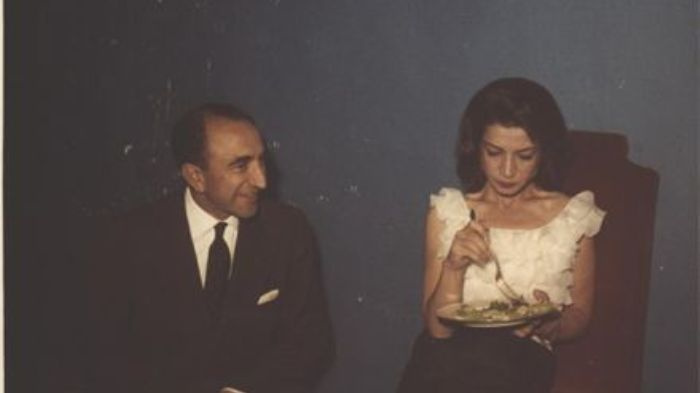Death of the ‘Black Panther’

(Ashraf Pahlavi with Minister of Royal Court Asadollah Alam. Source: IRDC)
“Black panther”, “smuggler, lewd, addicted”, and the “Notorious Player in the 1953 Coup”. It seems that Iranian media’s coverage of the death of Ashraf Pahlavi, the twin sister of the last shah of Iran Mohammad-Reza Pahlavi, was as lurid as her life itself.
Ashraf Pahlavi died on January 7th, 2016 at the age of 96. Among the international media, the New York Times was one of the first to report the news of Ashraf’s death and publish an obituary. “[A] glamorous and divisive figure”, the obituary read, she was “known equally for her work with the United Nations on behalf of women’s causes and her opulent lifestyle”.
In his BBC Persian piece, Masoud Behnoud, veteran Iranian journalist who chose Ashraf as one of the three main characters of his historical novel “In Seh Zan” (“These Three Women”), claims that Ashraf was behind both the appointment of Dr. Mohammad Mossadeq to premiership in 1951 and his ouster through a coup in 1953. Ashraf tried to reconcile Mossadeq with the royal family, Behnoud adds, but came to the conclusion that the prime minister was harboring the idea of reinstating the Qajar dynasty in power. She spent her pre-coup months in exile lobbying for Mossadeq’s ouster.
Popular rumors about her promiscuous lifestyle were the subject of another piece in BBC Persian. Claims “that she was unconstrained in her sexual relations with men, that the exact number of her sexual partners was not clear, that she had a hand in drug trafficking … should be left for history to judge. However, one should note that in a society like Iran [of those years], a traditional society in spite of the Pahlavis’ efforts, a woman like Ashraf could not retain an agreeable reputation.”
Iranian historian Majid Tafreshi also points to such rumors in an interview with Radio Farda: “Ashraf was a highly influential figure … British documents show that she and her sons were deeply involved in payola … a [divisive] black or white attitude surrounds her.”
“Death of the Black Panther”, the Reformist Shargh newspaper's piece on Ashraf’s death includes an anecdote from Asadollah Alam, Minister of Royal Court in Pahlavi court, which seems to confirm negative allegations against the Shah’s twin: “In a meeting with the Minister of Finance, Marshal Fathollah Minbashian had proposed an increase of financial support for army officers who traveled abroad for particular medications. Defending his suggestion, he had said: ‘compared to the money spent by Her Highness Ashraf on lechery, this is like a drop against an ocean’”. A lover of Ashraf, whom she had requested to accompany her in one of her UN visits, had asked for 300 thousand dollars as allowance for the trip. The cabinet approved the payment. Shargh continues that in the middle of the revolution, “Shah requested Ashraf to leave the country, since she had turned into the symbol of corruption and greed of the Pahlavi dynasty.”
Iran , the government’s mouthpiece, addressed her alleged role in the drug business, reminding the readers that the Shah’s twin was once detained in Geneva Airport, Switzerland, for carrying a load of heroine worth 2 million dollars.
Asr-e Iran quoted Ayatollah Khomeini, leader of the 1979 Islamic Revolution, from his interview with Italian journalist Oriana Fallaci. “Ashraf is the evil twin of the Shah, a traitoress, just like the Shah”, says Ayatollah Khomeini. “And for the crimes she committed, she must be prosecuted and condemned just as the Shah.” Unlike her father, Reza Shah, founder of the Pahlavi dynasty who is admired by many, and her brother, Mohammad Reza Shah, whose sad fate many lament, Ashraf’s death hardly raised feelings of compassion. It seems that many believed the main source of trouble that Mohammad-Reza Shah faced was because of Ashraf.
Tasnim, the Principlist news agency, was sharper in its criticism, calling Ashraf “a smuggler, lecherous, addicted and plunderer of public wealth”. The website referred to her weekly gatherings, her ‘dowreh’s, which were attended by the court, the ruling elite, and also journalists, poets, intellectuals and those who aspired to rise in the power hierarchy and establish links with the court.
Principlist Vatan-e Emrooz took a harsher tone, calling her death "An End to Promiscuity". The newspaper stressed that Ashraf's death had coincided with the issuance of the historical decree of ban on veil, 'kashf-e hejab', by the founder of the Pahlavi dynasty Reza Shah. "Destiny has taken the life of the daughter of the Pahlavi dictator 80 years after the issuance of this disgraceful decree" wrote Vatan-e Emrooz. "A daughter whose stories of promiscuity have invaded not only Iran, but the entire world."
After the news of her death came out, Ashraf's 49-million dollar mansion in Manhattan, New York, that was put up for sale last year was one of the most frequent pictures accompanying the obituaries. It seems that the only noticable legacy of Ashraf has been her opulent lifestyle, her notorious relations and her massive corruption.

